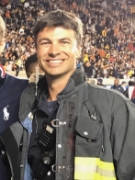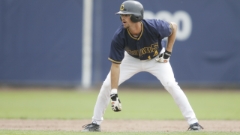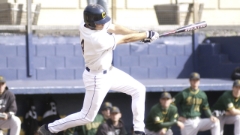
Former Cal Baseball Star Matt Einspahr Now Scores as Paramedic
In photo above former Cal baseball player Matt Einspahr (right) is holding son Jack, while daughter Avery is perched between two other Berkeley firefighters.
Matt Einspahr was an award-winning member of the Cal baseball team 15 years ago and had his eye on a professional career in that sport.
As is so often the case with college players he found that goal unrealistic so he sought another vocation. After a few career false starts, he is back in Berkeley saving lives rather than hitting baseballs as a paramedic with the Berkeley fire department. He found his inspiration on the diamond, and his story illustrates the role college sports teams can play in helping the transition from academia to real life, and how the principles learned on the playing field can provide lifelong assistance.

A paramedic which was already a challenging profession has become obviously moreso because of the coronavirus pandemic. They don’t call them “first responders” for nothing.
“For the first three or four tours when it started we kept changing the policies to figure out how to handle it,” Einspahr said in a recent interview.. “And we kind of figured out how to do it well. We have to go to every call assuming that everyone has coronavirus. We have to wear masks, gloves, goggles. And then if they have symptoms the primary paramedic will put on a gown and the others stand back and then hand him equipment.”
As a Bear, Einspahr was a team captain and winner of both the Wayne Hooper Award as the “Top Teammate” and the George Wolfman Award “Most Improved” in his senior season, 2005. That Cal team that had finished near the bottom of the conference the previous year, became a contender and by all rights should have been invited to the NCAA Tournament. They weren’t, but the final disappointment aside it was a fine year and Einspahr learned the value of teamwork, dedication and extra effort, virtues he still practices today.
Einspahr grew up in the Seattle area, the son of a pediatric surgeon and a nurse. A star high school shortstop with fine academic credentials he was fairly heavily recruited, especially by Ivy League schools. He came to Cal’s attention ironically enough at a summer camp run by Stanford.
“I had a really good camp,” he said. “There were a lot of East Coast schools represented there who tried to recruit me.”

But so did Stanford, Cal and St. Mary’s all of which had climate on their side. “I took an official visit to Boston College,” he said. “It was February and they showed me their baseball field. It was covered in snow.”
That was pretty much that as far as heading east. He finally chose Cal and became part of new coach David Esquer’s first recruiting class at Berkeley. His career took a while to get started, slowed by injury and a crowded roster..
“Finally I got the starting job at second midway through my junior year,” he said. “And my senior year I was the starting third baseman.”
Not only that, but he was also voted one of the team captains along with pitcher Matt Swanson, and took a real leadership role. “We were last in the Pac-10 my junior year and not expected to do much the next year,” he said. “Matt and I sat together and figured how are we going to take this young team to compete with the Pac-10 level of play. We are going to have to create a really good morale. We need a real strong effort to get together.”
Between Christmas break and the start of the spring semester, athletes are about the only students on campus.
“That time is golden for bonding,” he said. “We utilized that time really well, We wound up fourth in Pac-10 when we were supposed to be last. I learned a lot about leadership, morale and camaraderie. That was very beneficial to my career now.”
As a senior, he had a .313 batting average (a 73-point jump over the previous year) with 30 runs, 7 doubles, 4 home runs and 41 RBI, the team high.
“I thought I was going to get drafted, based on what the scouts were telling me,” he said, “They said about the 20th round, where I would sign for very little money but a chance to keep playing.”
But he was not selected. “I was very disappointed and very frustrated. Then about a week and a half later I got a call from an Independent League team, the Gary (Ind) South Shore Wildcats’
Although he did not play very much, the team invited him back the next year. He declined.
“Playing there was nice, but it also made me realize that baseball wasn’t something I wanted to do much longer,” he said. “If I wanted to have a family and actually have a career, I don’t think it would have been a good one in the minor leagues.”

He considered dentistry and banking, but both professions were confining for him. “How can I be indoors all day?’ he said. “I want to be more active.”
Several of the people he consulted for advice suggested fire-fighting. “I did three ride-alongs with three different departments and I was hooked,” he said.
Medical training is a requirement for firefighters and Einspahr found he enjoyed that part of the job. He initially qualified as an EMT (emergency medical technician) and rode on an ambulance. He eventually attended paramedic school
“As a paramedic you can do a lot more for your patients (than an EMT),” he said. “And I wanted to work in Berkeley and they hire only paramedics.”
He has been on the job there since 2009, and has rescued people from flaming buildings, treacherous waters, crushed cars.
Paramedics have to know not only advanced medical first aid, but also auto mechanics and building construction.
“Unlike what most people think, the most dangerous part of burning car is not the gas tank,” he said. “In the newer cars, it is the struts on the front bumpers. They are actually air, designed to cushion the effects of hitting a bump. But when the air heats up, the struts act as missiles and can go 100 yards.”
And when dealing with a fire in a building, knowing the age of the structure is vital. “When we walk into a building we want to determine the era it was built,” Eisnpahr said. “If it is pre World War II the fire is going to run through it way differently than if it were modern construction.”
And now there is the and now a mysterious, silent killer
“It has been an interesting shift,” Einspahr said. “We have had far fewer car accidents. But we did have a lot of people with short tempers. We had a road range that turned into a shooting, a stabbing. We have had violent crimes where they went off the edge and maybe they would’t have done that normally.
“Also we have only have had a few fires. Everyone is home now and no one is going out and leaving on some electrical device that can start a fire.
“We have actually taken a lot fewer people to the hospital than we usually do because the ER is not the safest place these days. Even if they don’t have it they can be exposed to somebody who does have it. We have to be very judicious about who gets transported to the hospital.”
Considering the potential for exposure, Einspahr and the Berkeley crew have been relatively lucky.
As of last week only one member of Einspahr’s crew had tested positive. “He has been through the virus, tested negative and he’s back at work already,” Einspahr said.
When he is not on ambulance duty, Einshpahr spends time with his wife Faye and their three children. Even in his busy schedule, he has time to reminisce about his Cal days.
“Even though it was a disappointment at the end, not making the MCAAs and not getting drafted, I have come to realize it was a good career and a great time.”